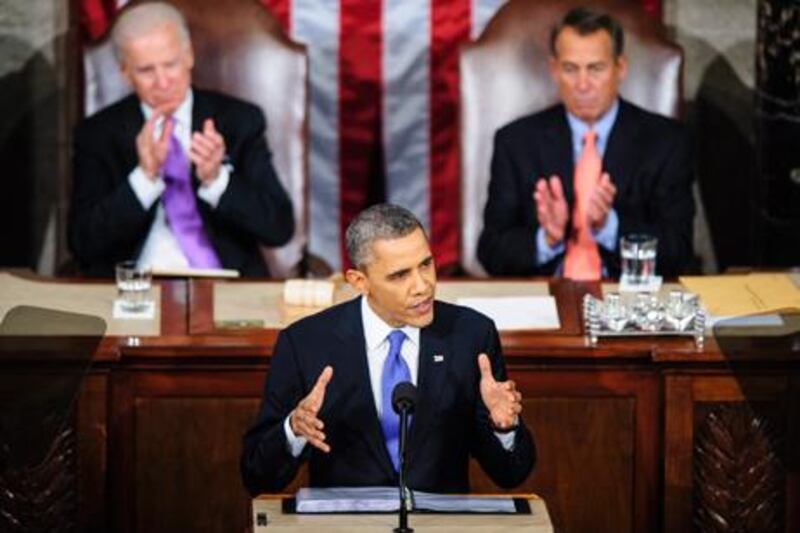NEW YORK // The US president called on a polarised Congress to support his initiatives for reviving the middle class through government investments and laid out a second-term agenda that included fighting climate change, stricter gun control and immigration reform.
In the first State of the Union address of his new term, President Barack Obama also announced plans to reduce the US military presence in Afghanistan by half, or 34,000 troops, within the next year.
"This drawdown will continue. And by the end of next year, our war in Afghanistan will be over," he said.
The accelerated withdrawal means that Afghan security forces will be forced to lead all combat operations earlier than originally expected as United States' longest war finally draws to a close.
The US president renewed his call for nuclear disarmament, while sharply rebuking North Korea for the nuclear test it conducted hours before he spoke: "Provocations … will only isolate them further."
He also briefly mentioned the Middle East. Addressing the ongoing transitions in the post-Arab Spring countries, he said: "The process will be messy, and we cannot presume to dictate the course of change in countries like Egypt; but we can - and will - insist on respect for the fundamental rights of all people."
He called on Iran to come to the negotiating table over its nuclear programme and added that his administration intends to keep pressure on the Syrian regime while supporting "opposition leaders that respect the rights of every Syrian".
But with an unsteady economic recovery threatening to jeapordise Mr Obama's wide-ranging agenda, and the looming spectre of massive automatic budget cuts kicking in next month, the focus of the night's speech was the US economy.
"Our economy is adding jobs - but too many people still can't find full-time employment. Corporate profits have rocketed to all-time highs - but for more than a decade, wages and incomes have barely budged," Mr Obama said.
"It is our generation's task, then, to reignite the true engine of America's economic growth - a rising, thriving middle class."
Adding specifics to the broad economic themes of his inaugural address three weeks ago, Mr Obama called for increased government spending on updating the country's deteriorating infrastructure, raising the minimum wage for the first time in six years and expanding pre-school education to every American child.
He reiterated his plan to accomplish these investments without adding to the budget deficit "by a single dime" through a combination of tax increases on the wealthy and spending cuts to some social programmes.
He offered few specifics, however, on what he on what he wanted to see cut, focusing instead on the need to protect programs that help the middle class, elderly and poor.
Mr Obama also said that his administration will work to achieve free trade deals with the European Union and east Asian countries.
"To boost American exports, support American jobs, and level the playing field in the growing markets of Asia, we intend to complete negotiations on a Trans-Pacific Partnership," he said. "And tonight, I am announcing that we will launch talks on a comprehensive Transatlantic Trade and Investment Partnership with the European Union."
Returning back to the economy throughout the speech, Mr Obama announced other initiatives to boost American competitiveness through affordable higher education, high-tech "manufacturing institutes" and a doubling of renewable energy use by 2020.
While a limited number of these initiatives would be achievable through executive order, most would require some measure of consensus in a deeply divided Congress that will already be confronting the difficult priority issues of sweeping immigration reform and new restrictions on gun ownership. Mr Obama also called on Congress to tackle the threat of climate change, an issue that eluded him in his first term.
"We can choose to believe that Superstorm Sandy, and the most severe drought in decades, and the worst wildfires some states have ever seen were all just a freak coincidence. Or we can choose to believe in the overwhelming judgment of science - and act before it's too late."
The most emotional moment of the night came as Mr Obama urged Congress to approve his proposals for stronger gun laws, including background checks for all gun buyers, making gun trafficking a federal offence for the first time and bans on assault weapons and high-capacity magazines.
"What I've said tonight matters little if we don't come together to protect our most precious resource -- our children."
Pointing to the parents of a Hadiya Pendleton, a Chicago teenager who had performed at Mr Obama's inauguration less than a month ago and last week was shot to death near Mr Obama's home in Chicago, he said: "Hadiya's parents…are in this chamber tonight, along with more than two dozen Americans whose lives have been torn apart by gun violence. They deserve a vote.
Democrats in the chamber clapped and chanted "Vote! Vote!" as Mr Obama mentioned the cities where mass shootings have recently taken place.
As the cheers died down, a woman in the public gallery shouted in favour of gun rights before a police officer escorted her from the chamber.
A number of Republican members of Congress had given tickets to gun supporters, but it was not unclear which legislator had invited the woman.
tkhan@thenational.ae with additional reporting by the Associated Press






